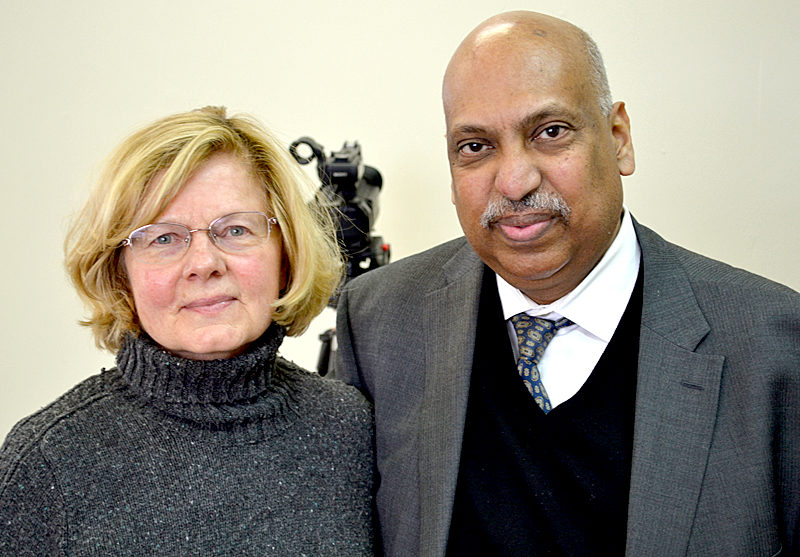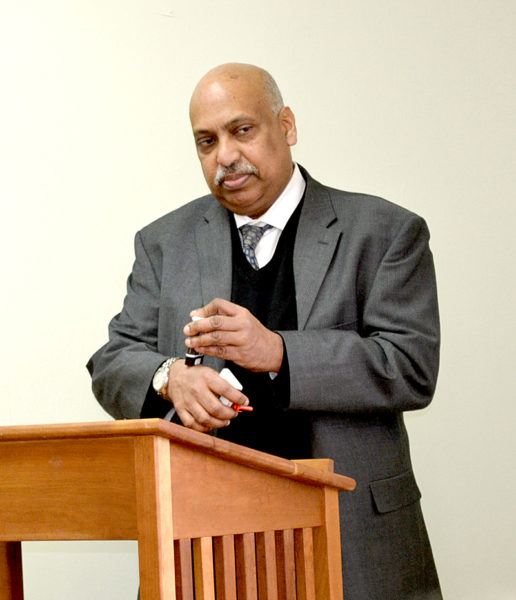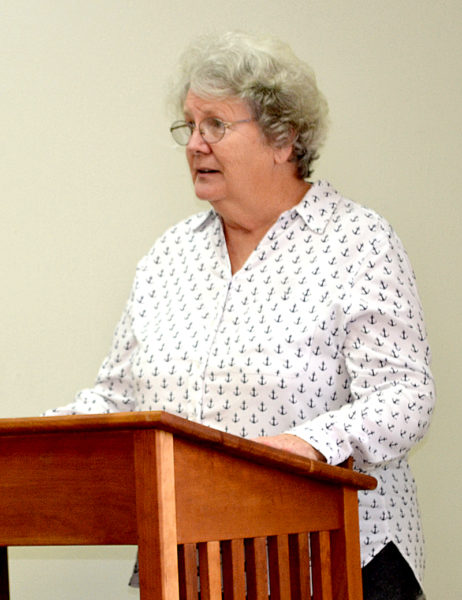
Jeanette Wheeler and Dr. Punyamurtula Kishore at the National Library of Health and Healing in Waldoboro on Feb. 8. Kishore established the library with Wheeler’s support. (Abigail Adams photo)
A Massachusetts doctor has brought his once highly acclaimed addiction-treatment model to Waldoboro, but recently served jail time and lost his medical license in a criminal case that shut down his network of 52 addiction-treatment offices in Massachusetts.
Dr. Punyamurtula Kishore, of Brookline, Mass., is the founder of the National Library of Health and Healing, which has its headquarters at the Charles C. Lilly American Legion Post at 181 Jefferson St. in Waldoboro.
In a series of interviews, Kishore described his conviction and the loss of his medical license as the result of attacks motivated by his success in challenging the status quo in the field of addiction treatment. He said the case will not stop his work to combat addiction in Maine.
The library is a place where people can come for information, training, guidance, and coaching on addiction recovery, Kishore said. It is a rebranding of the National Library of Addictions, he said, a defunct nonprofit that was affiliated with his former practice, Preventive Medicine Associates Inc.
Preventive Medicine Associates was a network of medical practices throughout Massachusetts that specialized in a “primary care model” for addiction treatment. The treatment model is community-based and focuses on home detoxification, sobriety maintenance, and sobriety enhancement, Kishore said. Kishore was the network’s founder and medical director.
In 2011 and 2013, Preventive Medicine Associates and Kishore were indicted on multiple charges related to “a complex kickback scheme to funnel a lucrative drug screening business” to laboratories in Preventive Medicine Associates’ network, according to a press release from the Massachusetts Attorney General’s Office.
Preventive Medicine Associates pleaded guilty to eight counts of Medicaid kickbacks, 19 counts of Medicaid false claims, and 11 counts of larceny over $250 in April 2015.
Kishore pleaded guilty to one count of larceny over $250 and was sentenced to serve 11 months in jail, pay $9.3 million in restitution, and give up his Massachusetts medical license, according to the press release.
The court case destroyed Preventive Medicine Associates and the National Library of Addictions, Kishore said. He and his supporters say he was targeted and persecuted due to his success in treating heroin and opioid addiction.
His model challenged the status quo in addiction treatment, such as medication-assisted treatment with methadone and Suboxone, Kishore said.
Kishore is now working with Waldoboro residents to bring the primary care model of addiction treatment to Maine. The National Library for Health and Healing is organizing educational workshops and trainings for community members about addiction treatment and recovery, which Kishore said he hopes to expand to include training for medical practitioners.
The court case may have resulted in the loss of his medical practice and license, “but they can’t take away what’s in my mind,” Kishore said. With the support of the Waldoboro community, he hopes his addiction-treatment model, which he referred to as “the Massachusetts model,” will become known as “the Maine model.”
The model
Kishore’s first foray into addiction treatment came after working with the Washingtonian Center for Addictions in Boston while pursuing a master’s degree from the Harvard School of Public Health in the 1970s, according to the trade publication M.D. News.
The Indian-born doctor with a medical degree from Andhra University in India would go on to work as the associate medical director for the Massachusetts Department of Corrections and hold various faculty positions with institutions including Harvard University and the University of Massachusetts, according to Kishore’s website.
Kishore founded the National Library of Addictions in 1993 and Addiction Medicine Associates in 1996. Addiction Medicine Associates later became Preventive Medicine Associates. The medical practice, which grew to 52 offices across Massachusetts, pioneered a new approach to addiction treatment, Kishore said.
The approach was recognized by the Association for Medical Education and Research in Substance Abuse in 2004 with the Best Abstract Award for “outstanding original research in substance abuse,” according to the award notification letter.
The primary care model stresses home detoxification instead of inpatient treatment for drug addiction, with primary care physicians trained in addiction medicine guiding patients through the process, Kishore said.
The symptoms of withdrawal are not unlike the flu, “and if a doctor can treat the flu, they can treat withdrawal,” Kishore said. Once a patient goes through withdrawal, the focus then turns to sobriety maintenance and enhancement, Kishore said.
It usually takes 90 days for an individual to break the pattern of addiction and overcome the cravings that result in the loss of control and subsequent consequences for the addict, Kishore said.
To ensure patients with heroin and opioid addictions maintain their sobriety, they are asked to complete urine tests and may be given injections of naltrexone, a medication that blocks cravings for opioids, Kishore said. After 90 days, patients “start to like their lives again” and the likelihood of relapse is greatly reduced, he said.
The model then focuses on sobriety enhancement, with community-based supports, Kishore said. Jobs, hobbies, and spiritual guidance are key factors in an individual’s continued sobriety, he said.
Kishore works closely with religious organizations that “fill the spiritual hole in addicts” and help individuals re-establish their identity, which is often lost during the period of substance abuse, he said.
The model was so successful, the practice quickly grew from a single office in Brighton, Mass. to about 52 offices throughout the state, with 370 staff and 29 doctors treating about 250,000 patients, Kishore said. Patients sought out treatment at his medical practices because it was a needed alternative to medication-assisted treatment, he said.
The Boston Celtics recognized Kishore with the Hero Among Us award in 2004 for his work in addiction treatment. In 2010, Kishore was elected a fellow of the American Society of Addiction Treatment Medicine for his contributions to American medicine.
Preventive Medicine Associates also received authorization to train physicians and pharmacology students in addiction medicine.
The practice closed, however, as a result of the publicity and financial drain of the Massachusetts Attorney General’s Office criminal case against it, Kishore said.
In 2011, Kishore was arrested and charged, alongside Preventive Medicine Associates, for wrongly billing MassHealth millions of dollars for urine testing, according to the Massachusetts Attorney General’s Office. The office would bring an additional 22 charges against Kishore in 2013.
The case
After an extensive investigation by the Medicaid Fraud Division of the Massachusetts Attorney General’s Office, Kishore and several owners of sober houses were arrested and charged with running a “criminal kickback scheme,” according to a press release from the Massachusetts Attorney General’s Office.
Kishore “used bribes, or kickbacks, to induce sober house owners to send their residents’ urine drug screening business to his laboratories for testing,” according to the press release. Medicaid-eligible residents were screened up to three times a week at a cost of $100-$200 to MassHealth, the state’s Medicaid program, each time.
Preventive Medicine Associates never treated many of the sober house residents who underwent drug screenings, a requirement for billing MassHealth, according to the press release. Kishore and Preventive Medicine Associates were each charged with eight counts of Medicaid kickbacks and eight counts of Medicaid false claims, all felonies, in 2011.
Four owners and operators of sober houses were also charged in connection to the case.
Also in 2011, Precision Testing Laboratories, a competing urine screening company, filed a civil suit against Preventive Medicine Associates, Kishore, and several of Kishore’s real estate holding companies, according to court records.
The suit claimed Precision lost business as a result of sober homes’ exclusive relationships with Kishore, according to the Boston Globe.
Precision’s lawyers found numerous payments to sober homes from Kishore-controlled accounts, including an account belonging to the National Library of Addictions, the Boston Globe reported.
Kishore’s practice, which he said generated about $25 million in revenue a year, received $4.9 million annually in Medicaid payments, the Boston Globe reported.
Kishore disputed the Globe’s reporting as biased and “unsuitable for publication,” and said it contributed to his becoming a target for cyberbullying.
In 2013, Kishore and Preventive Medicine Associates were charged with an additional 11 counts of Medicaid false claims and 11 counts of larceny over $250, also felony charges.
Kishore said his practice was “scrutinized to the nth degree by regulators” and received positive reviews after inspection. Preventive Medicine Associates was following federal safe harbor regulations in its relationship with sober houses, he said.
Safe harbor regulations describe payments and business practices that may invoke federal anti-kickback laws but are not treated as offenses, according to the U.S. Department of Health and Human Services’ Office of Inspector General.
In April 2015, Kishore pleaded guilty to one count of larceny over $250, and his former practice, which was no longer operating, pleaded guilty to all 38 charges brought against it.
The state placed the other 37 charges against Kishore on file for 10 years – the length of Kishore’s probation – with a plea of not guilty, giving the state the right to re-prosecute them if Kishore violates probation, according to court records.
Kishore was sentenced to 360 days in jail, with one month suspended for 10 years. He was ordered to surrender his Massachusetts medical license and his passport, and pay $9.3 million in restitution, according to the Massachusetts Attorney General’s Office. He is also prohibited from performing services for or billing Medicaid or Medicare anywhere in the U.S.
As of March 1, 2017, only $1,400 in restitution has been received, according to court records.
The case involved “blatant theft of state funds that were supposed to go toward care for some of our most vulnerable residents,” the Massachusetts Attorney General’s Office said in a press release. “This is fraud that undermines the integrity of our health care system.”
Kishore said he accepted the plea deal out of exhaustion. After spending about $2 million in legal fees, he could not afford to fight the additional charges, he said. He spent eight months and four days in jail, he said.
The case was settled through a plea deal, so there will be no appeal of the conviction, according to the Massachusetts Attorney General’s Office.
Several months after the resolution of the criminal case, in December 2015, a settlement was reached in Precision Testing Laboratories’ civil case against Kishore.
Kishore and Preventive Medicine Associates agreed to pay $4,481,778 on three counts, including unfair methods of competition, intentional interference with advantageous business relationships, and civil conspiracy, according to court records.
Four additional counts were dismissed, and Kishore waived all rights to appeal, according to court records.
Waldoboro

Dr. Punyamurtula Kishore demonstrates an injection of the overdose-reversing drug Narcan during a workshop at the National Library of Health and Healing on Feb. 8. (Abigail Adams photo)
Heroin and opioid addictions are now in every community, and overdose rates are skyrocketing, Kishore said. “My mind is always thinking, so I put my old model on steroids and vastly improved it,” he said. “We have to train the community … addiction is a social problem and it requires a social solution.”
Since meeting Jeanette Wheeler, of Waldoboro, Kishore has been working to institute community trainings that will bring the primary care model for addiction treatment to Maine. Wheeler and Kishore crossed paths about eight months ago at a conference on home schooling, Wheeler said. She is an outspoken advocate for and supporter of his work, despite the criminal case in Massachusetts.
Kishore’s model for addiction treatment works, and he is helping the community of Waldoboro, which needs the help, she said.
Wheeler lost a family member to an opioid addiction that arose from painkillers prescribed to treat endometriosis. The loss of a loved one to an overdose is “something that no one should have to endure,” Wheeler said.
Wheeler does not believe Kishore is guilty of any crime. She believes he was a scapegoat in a politically motivated case. “He served his time,” Wheeler said. “Now leave him alone and let us learn from him.”
With Wheeler’s help, Kishore established the National Library for Health and Healing at the Legion post last year in a space Kishore rents for $600 a month, Wheeler said.
Kishore said the library is working to serve as “a platform” for education and training on addiction treatment.
“Coaching, guidance, teaching, training. That’s what good libraries do,” Kishore said. “It’s not just a collection of books.” The library holds public workshops and forums, which are free and open to the public, including a workshop about fentanyl with veterinarian Dr. Karin Tichy in February.
After Tichy’s presentation, Kishore demonstrated how to administer the overdose-reversing drug Narcan and talked about the purpose of the library.
“Where else can people meet like this?” Kishore said at the workshop, which he called “a great start” to the National Library of Health and Healing’s work.
Dr. Michael Gendre, a professor of humanities at Middlesex Community College, hosted an addiction recovery training for Waldoboro residents at the library Friday, Feb. 24.
The library does not have regular hours. Kishore commutes from Massachusetts for events, Wheeler said. However, the library hopes to ramp up its education and training workshops, and increase its presence in the community, she said.
The library hopes to eventually train medical practitioners in Kishore’s primary care model and serve as a space for recovery coaching, Kishore said.

Waldoboro Selectman Katherine Winchenbach addresses a crowd in attendance for a lecture about fentanyl at the National Library of Health and Healing in Waldoboro on Feb. 8. (Abigail Adams photo)
Waldoboro Selectman Katherine Winchenbach has attended workshops at the library and is another outspoken advocate for Kishore’s work. His model for addiction treatment has proved successful, Winchenbach said.
His teachings and his former patients “took a dive” when the charges were brought against him, she said. “I don’t think that’s fair.”
“There are two sides to every story,” Winchenbach said. “He was doing good. He wasn’t treating opioid addiction with another opioid.” Kishore and the National Library of Health and Healing are needed to address addiction in the community, she said.
The Waldoboro Police Department is aware of Kishore’s case in Massachusetts and of the National Library for Health and Healing, Chief Bill Labombarde said. Kishore is not administering medicine or medically treating patients, so it does not appear that the law is being violated, he said.
As a member of the Lincoln County Recovery Collaborative, the police department connects individuals struggling with addiction to treatment resources. While the department is neutral on the library, it is not something the department is ready to endorse due to the case against Kishore in Massachusetts, Labombarde said.
Educational trainings are not a violation of the terms of Kishore’s probation, according to the Massachusetts Attorney General’s Office.
The Maine Attorney General’s Office acknowledged contact with the Massachusetts Attorney General’s Office about the case, but a spokesman said he could not confirm “the existence or nonexistence” of an investigation.
While he is unable to practice medicine, Kishore said he hopes to educate and train others.
With the rise in heroin and opioid addictions and overdose deaths, “we’ve got a lot to learn (from Kishore),” Wheeler said. “I believe in him. We need this man’s expertise.”



